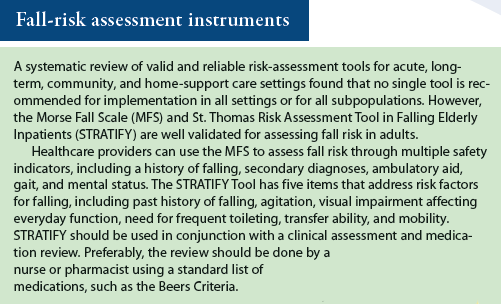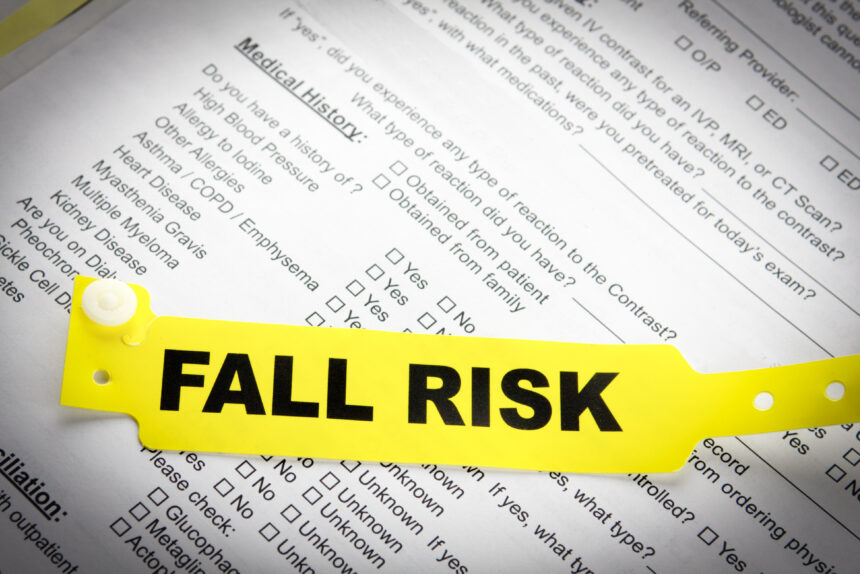The 5-Minute Rule for Dementia Fall Risk
The 5-Minute Rule for Dementia Fall Risk
Blog Article
Not known Factual Statements About Dementia Fall Risk
Table of ContentsThe Only Guide for Dementia Fall RiskNot known Details About Dementia Fall Risk All About Dementia Fall RiskSome Known Details About Dementia Fall Risk Unknown Facts About Dementia Fall Risk
Evaluating loss threat assists the entire health care team develop a much safer setting for every individual. Make sure that there is an assigned area in your clinical charting system where staff can document/reference scores and document pertinent notes associated to fall prevention. The Johns Hopkins Fall Threat Assessment Device is among numerous tools your team can utilize to assist prevent adverse clinical events.Patient falls in health centers are typical and incapacitating negative events that persist despite decades of initiative to decrease them. Improving communication across the examining registered nurse, care group, patient, and individual's most entailed good friends and family members might enhance loss avoidance initiatives. A team at Brigham and Women's Health center in Boston, Massachusetts, looked for to create a standard loss prevention program that centered around enhanced interaction and individual and household interaction.

The innovation team stressed that successful implementation depends on individual and staff buy-in, integration of the program into existing operations, and integrity to program procedures. The team kept in mind that they are coming to grips with exactly how to guarantee continuity in program application throughout periods of situation. During the COVID-19 pandemic, for instance, an increase in inpatient drops was connected with restrictions in patient interaction together with constraints on visitation.
The Single Strategy To Use For Dementia Fall Risk
These incidents are typically thought about avoidable. To apply the intervention, organizations need the following: Access to Loss pointers resources Autumn TIPS training and retraining for nursing and non-nursing personnel, including new registered nurses Nursing process that permit for individual and household engagement to perform the drops evaluation, guarantee usage of the avoidance plan, and carry out patient-level audits.
The outcomes can be very detrimental, often accelerating client decrease and causing longer healthcare facility remains. One research approximated remains boosted an added 12 in-patient days after a client autumn. The Autumn TIPS Program is based on engaging patients and their family/loved ones across 3 main procedures: analysis, personalized preventative interventions, and bookkeeping to make sure that individuals are engaged in the three-step autumn avoidance procedure.
The individual evaluation is based upon the Morse Loss Scale, which is a verified fall threat analysis tool for in-patient medical facility setups. The scale includes the 6 most common reasons people in hospitals drop: the client loss background, high-risk problems (consisting of polypharmacy), usage of IVs click site and other outside devices, mental status, gait, and movement.
Each threat factor web links with one or even more workable evidence-based treatments. The registered nurse creates a strategy that incorporates the treatments and is noticeable to the care team, person, and family on a laminated poster or published visual aid. Nurses develop the strategy while meeting with the client and the patient's family.
The Greatest Guide To Dementia Fall Risk
The poster works as a communication device with other participants of the person's treatment group. Dementia Fall Risk. The audit part of the program includes examining the patient's expertise of their danger elements and avoidance strategy at the system and medical facility degrees. Nurse champions carry out at least 5 specific interviews a month with patients and their family members to look for understanding of the fall prevention strategy

An estimated 30% of these drops result in injuries, which can vary in intensity. Unlike other damaging events that call for a standard scientific reaction, loss prevention depends very on the requirements of the patient.
Dementia Fall Risk Things To Know Before You Buy

Based upon auditing results, one website had 86% compliance and two websites had over 95% compliance. A cost-benefit evaluation of the Fall ideas program in eight healthcare facilities approximated that the program cost $0.88 per individual to implement and led to financial savings of $8,500 per 1000 patient-days in direct prices associated with the prevention of 567 drops over 3 years and eight months.
According to the advancement group, organizations thinking about implementing the program ought look at this web-site to carry out a preparedness assessment and falls prevention spaces evaluation. 8 Furthermore, companies should guarantee the needed framework and operations for implementation and develop an application strategy. If one exists, the organization's Loss Prevention you could look here Task Force ought to be included in preparation.
Dementia Fall Risk - Questions
To start, companies must guarantee completion of training components by registered nurses and nursing aides - Dementia Fall Risk. Health center team must examine, based on the needs of a healthcare facility, whether to utilize a digital wellness document printout or paper version of the loss avoidance plan. Applying groups ought to hire and educate nurse champs and develop processes for bookkeeping and reporting on fall data
Staff need to be included in the process of redesigning the operations to engage patients and family members in the evaluation and prevention strategy process. Equipment ought to remain in area to ensure that units can recognize why an autumn took place and remediate the cause. More particularly, nurses must have channels to give continuous responses to both staff and device leadership so they can change and improve autumn avoidance workflows and connect systemic problems.
Report this page